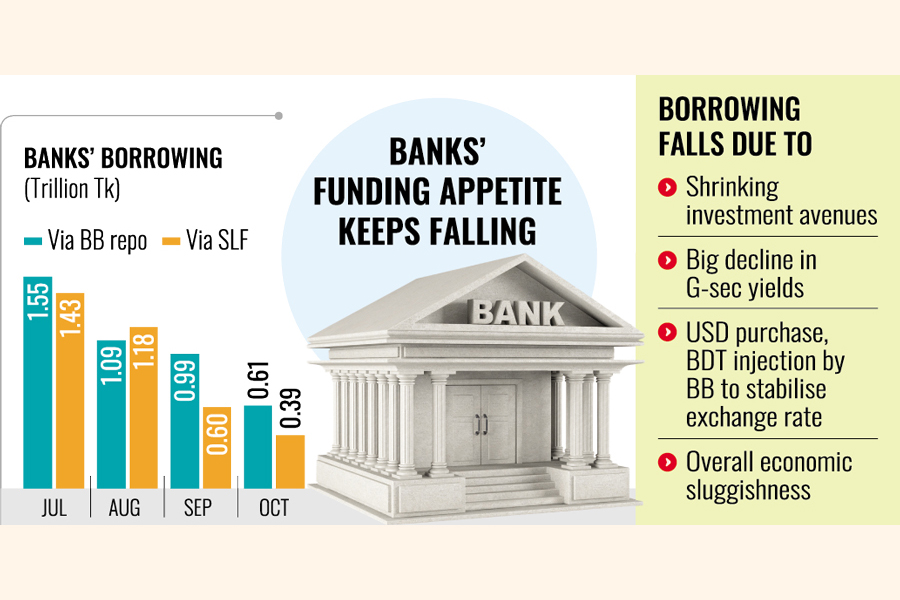BANKS WONDER WHERE TO INVEST BORROWED MONEY
Special liquidity feeding dries up, G-sec cools
Regulator in double bind: to tame inflation, stabilise forex market

Published :
Updated :

A generous state recipe feeding funds to liquidity-strapped banks now dries up as the regulator balances inflation control and forex stability while bankers wonder where to invest amid private-sector credit crunch.
Amid such a double bind, a spree in commercial banks borrowing from the central bank drops significantly in recent months, due mainly to shrinking investment avenues amid persisting overall economic sluggishness.
Officials and money-market experts draw such inferences, saying that banks' fund appetite keeps dampening since the yields on government securities (G-sec)--the only investment avenue amid the existing economic slowdown, where the lenders feel some sort of comfort because of higher bets-drops remarkably.
Simultaneously, Bangladesh Bank, the country's central bank, purchases dollars and releases taka on the market in its bid to keep the previously foreign-exchange market and pursues contractionary monetary stance to tame obdurate inflation.
The central bank has so far purchased $2126 million (2.13 billion) from the banks since July 13 last and injected around Tk 259 billion in exchange into the market to keep the exchange rate stable, which also played a key role in lessening banks' borrowing using BB's liquidity-feeding instruments like central bank repo and special liquidity supports.
Central bank repo and special liquidity facility are the two major instruments for the commercial lenders to use in borrowing a significant volume of funds from the banking regulator to meet their regular liquidity demands.
According to BB statistics, the scheduled banks altogether borrowed Tk 1.55 trillion in July, using central bank repo, in the first month of the fiscal year. Since then, the figure kept dropping to record Tk 1.09 trillion, Tk 996 billion and a peanut Tk 616 billion in August, September and October respectively.
On the other hand¸ through the special liquidity facility under which there is seven borrowing windows like ALS (assured liquidity support), AR (assured repo) and IBLF (Islami Banks Liquidity Facility), the banks overall borrowed Tk 1.43 trillion from the central bank in July. The monthly-borrowing volume declined to Tk 1.18 trillion, Tk 603 billion and Tk 396 billion in August, September and October respectively.
Executive director (grade-1) of the Bangladesh Bank Dr Md. Ezazul Islam says the current situation in banks indicates that the contractionary monetary stance of the regulator to contain inflation starts transmitting to the market.
He says the private-sector credit growth dropped to a historical low of 6.29 per cent while the deposit growth increased to over 10 per cent. It signals that the bank has surplus liquidity but not enough investment avenues under the economic slowdown.
In fact, there are banks that feel comfort to park their surplus credits into the state-guaranteed standing deposit facility (SDF) even after a 50-basis-pont cut in the SDF rate to 8.0 per cent.
Dr Islam, who leads the monetary policy department of the central bank, says the commercial banks were observed borrowing heavily from the BB and investing in G-sec to make hefty gains even few months ago when the yields on treasury bills and bonds were over 12 per cent.
"In October, it dropped below or just over 10 per cent. So, the borrowing of funds from BB at 10 per cent and investing in G-sec is no longer suitable for them," he adds.
Managing director and chief executive officer of Mutual Trust Bank (MTB) PLC Syed Mahbubur Rahman says the investment avenues for banks keep shrinking because of the current macroeconomic situation.
On the other hand, the banking regulator injected a good volume of liquidity into the market through buying over 2.0 billion dollars from banks in recent months as part of its foreign-exchange-market intervention to keep exchange rate stable.
"This is one of the major reasons behind the plummeting borrowing demand of banks from the BB," the experienced banker explains the monetary arithmetic.
Managing director of Shahjalal Islami Bank PLC Mosleh Uddin Ahmed also notices a drastic demand drop from the private sector in recent months while banks seem to be very cautious to investment to maintain a sound year-end balance-sheet under this challenging period of time.
"The country needs to make its economic activities vibrant somehow by ways of creating a congenial investment atmosphere for both banks and private sector," the noted banker suggests.
jubairfe1980@gmail.com


 For all latest news, follow The Financial Express Google News channel.
For all latest news, follow The Financial Express Google News channel.